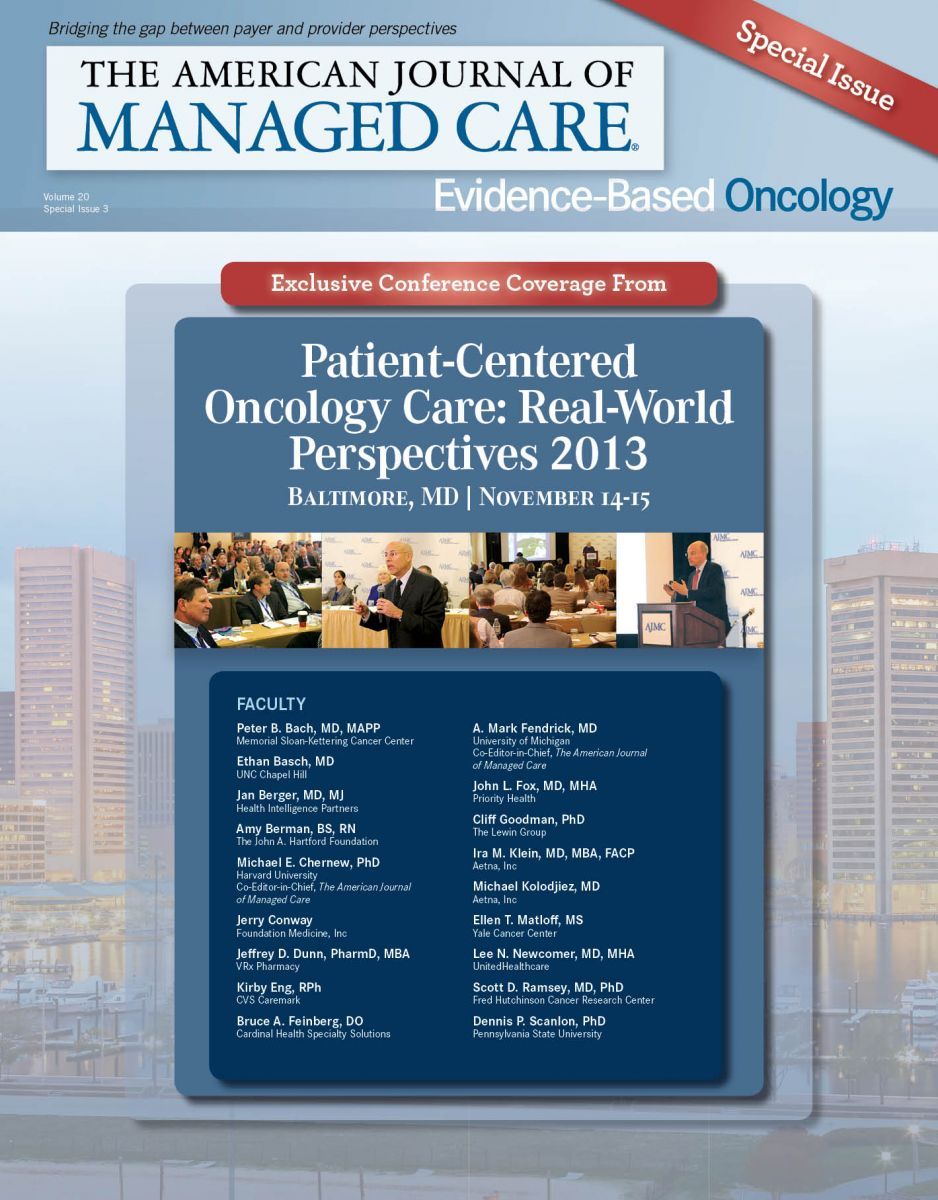- Center on Health Equity & Access
- Clinical
- Health Care Cost
- Health Care Delivery
- Insurance
- Policy
- Technology
- Value-Based Care
Grappling With the Fallout of Genetic Testing, in Oncology and Beyond
Moving beyond the topic, Companion Diagnostics in Targeted Treatment, the panel took on the unregulated nature of testing in the wake of the June 2013 US Supreme Court ruling against Myriad Genetics, which ended the company's BRCA testing monopoly.
Moving beyond the topic, “Companion Diagnostics in Targeted Treatment,” the panel that followed took on the unregulated nature of testing in the wake of the June 2013 US Supreme Court ruling against Myriad Genetics, which ended the company’s BRCA testing monopoly. Ira M. Klein, MD, MBA, FACP, chief of staff, Office of the Chief Medical Officer, Aetna, Inc, served as moderator for the discussion with Jan Berger, MD, MJ, president and CEO of Health Intelligence Partners, and Michael A. Kolodziej, MD, national medical director for Oncology Strategies at Aetna, Inc. Berger is also editor-in-chief of The American Journal of Pharmacy Benefits.
In an ideal world, every cancer patient would get high-quality genetic counseling before a test is ordered, said Ira M. Klein, MD, MBA, FACP, as he launched the discussion. Short of that, he asked, who should be doing the companion diagnostic testing, given the shortage of counselors and the pressing needs?
Jan Berger, MD, MJ, said she would answer from the employers’ perspective, since they often are ultimately paying for the test through insurance coverage. “It is a really tough question, and there isn’t a good answer,” she said, comparing the situation with the one faced by doctors treating HIV patients in the 1980s. HIV was new, treatment wasn’t effective, and counselors were scarce—which could mean delays in getting counseling in the face of a lifethreatening illness.
Michael A. Kolodziej, MD, pointed out the many issues raised during Lewis’ talk, and added a few more: “Next-gen sequencing is going to change the rules completely. We went from an argument about whether you could have a patent on the BRCA test (the US Supreme Court said no) to a world in which there’ll be a platform for under $1000 to test for every single known hereditary susceptibility.”
Besides the issues of quality and clinical utility are more basic ones, such as, “Not everybody wants to know.”
Kolodziej highlighted the potential for testing costs to overwhelm payers, because the testing universe is hardly limited to patients newly diagnosed with cancer. “The population for whom this is geared is America. Just think about that for a second.”
“So, you’ve got quality control problems, so we’ve got analytic validity, and then clinical validity and clinical utility,” Klein said in summation. “I think that as the tests become not just for people with cancer, but for the United States, then that does open up a can of worms.”
He asked, what guidance can payers give to physicians on the front lines?
Right now, Kolodziej said, not much. There are too many testing companies, and many laboratory-developed tests are not even regulated by the US Food and Drug Administration (FDA). Until recently, codes for the tests made them impossible to track. It’s beyond the reach of most payers to check on the effectiveness of every test provider.
Berger noted that even large employers who try to get good answers are stymied by the lack of agreement. However, she has seen a case where a consensus emerged to not permit employees to use flexible-spending accounts for direct-to-consumer tests such as 23andMe, because of the resulting claims for follow-up testing and procedures.
“It created a disaster,” Berger said.
But, Klein asked, what is the appropriate level of consumerism?
Kolodziej noted that 23andMe president Anne Wojcicki gave an interview that essentially said, “Everybody should just do it.”
“The issue with everybody should just do it is this: Who should inform them of the results? Who should counsel them about how to act on (the results) and what are the downstream effects of that?”
“Your health beliefs really come into play,” Berger added.
Kolodziej wondered if every person would get their genetic results on a flash drive to hand to the doctor, and speculated, “I’m sure there’s an industry that’s going to spring up that’s going to help us interpret that, so that the doctor can get a report with added expense.”
To which Klein asked, “What do you think about the fact that we don’t measure how the test changes physician behavior?”
“We have no idea,” Kolodziej concluded.
EBO
NOTE: After this panel met November 15, 2013, the FDA ordered 23andMe to halt marketing of its tests. Wojcicki issued a statement agreeing to comply with FDA regulatory review.

Quality of Life: The Pending Outcome in Idiopathic Pulmonary Fibrosis
February 6th 2026Because evidence gaps in idiopathic pulmonary fibrosis research hinder demonstration of antifibrotic therapies’ impact on patient quality of life (QOL), integrating validated health-related QOL measures into trials is urgently needed.
Read More
Building Trust: Public Priorities for Health Care AI Labeling
January 27th 2026A Michigan-based deliberative study found strong public support for patient-informed artificial intelligence (AI) labeling in health care, emphasizing transparency, privacy, equity, and safety to build trust.
Read More
Ambient AI Tool Adoption in US Hospitals and Associated Factors
January 27th 2026Nearly two-thirds of hospitals using Epic have adopted ambient artificial intelligence (AI), with higher uptake among larger, not-for-profit hospitals and those with higher workload and stronger financial performance.
Read More
Motivating and Enabling Factors Supporting Targeted Improvements to Hospital-SNF Transitions
January 26th 2026Skilled nursing facilities (SNFs) with a high volume of referred patients with Alzheimer disease and related dementias may work harder to manage care transitions with less availability of resources that enable high-quality handoffs.
Read More

